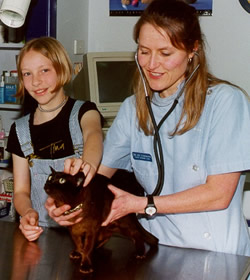Routine health care for cats

Your cat should be:
- desexed
- vaccinated against infectious diseases
- given regular preventive treatments for parasites, such as fleas and worms
- regularly groomed
- checked daily for signs of illness.
Desexing
In general, cats can be safely desexed from 3 months of age. Desexing at a younger age can be less stressful for kittens than it would be for older cats, and they may recover more quickly. Importantly, it also eliminates the risk of unwanted litters since female cats can begin reproducing from four months of age.
Along with helping to prevent cat overpopulation, there are other benefits of desexing cats.
- Desexed cats can be better behaved and are less likely to roam.
- Desexing cats can also prevent them from getting certain types of cancer.
Your vet can give you further guidance on desexing your kitten or cat. You can also Find out more about early age desexing.
Vaccinations
Vaccination protects your cat against various diseases which can cause pain, distress and sometimes death. For some viral diseases (e.g. feline enteritis and cat flu) previously infected cats will become lifelong carriers of the virus and spread it to other cats, even if they are no longer symptomatic.
As well as safeguarding your own pet, vaccination also prevents diseases from being passed onto other animals.
Vaccinations protect your cat against the following infectious diseases
- Feline Enteritis (or Feline Panleukopenia)
- Feline Respiratory Disease (Cat Flu)
- Chlamydia (or Chlamydophila)
- Feline Leukaemia (FeLV)
- Feline Immunodeficiency Virus (FIV or Feline AIDS).
Ask your veterinarian about which vaccine is most suitable for your cat.
Some boarding catteries may require specific vaccines before your cat will be accepted for boarding.
Kittens
In the first couple of months of their lives, kittens are temporarily protected against many diseases by the antibodies received through their mother’s milk. This acquired immunity starts to decline when kittens wean off the milk. It is recommended that kittens be vaccinated at 6-8 weeks of age, followed by 2 booster vaccinations given 4 weeks apart.
Adult cats
Immunity from kitten vaccinations weakens over time and your cat can again become susceptible to diseases. To continue protecting your cat, it is recommended adult cats receive boosters according to the vaccination schedule recommended by your vet.
Parasite control – fleas, mites and worms
Cats should be given regular treatments to prevent them from suffering from fleas, mites and worms.
Fleas and mites are common skin parasites in cats, causing itching, chewing and licking. The skin may become red and inflamed. You might see fleas on your cat, or you might see small dark flecks (flea 'dirt') in the fur and on the skin.
Common worms in cats include intestinal worms, lung worms and heartworm. Heavy infestation can cause severe illness and can even be life threatening.
Ask your vet for advice about which worming products to use and how often to use them. Worms can also be harmful to cat owners, so it's important to treat your cat and prevent them.
Importantly, never use a dog flea treatment on cats. This can be fatal.
Grooming
All cats need regular grooming, but long-haired cats need more coat care than short-haired cats.
A long-haired cat should be combed and brushed once a day while a cat with short hair will usually only need brushing twice a week. Get a brush and comb that are suited to the hair type of your cat.
Dental care
Like humans, good oral hygiene is important for your cats.
The build-up of tartar (calcified plaque on the surface of teeth and gum) can lead to gingivitis, gum disease and other dental diseases. If left untreated, periodontal disease can result in tooth loss and serious infections in the heart, liver and kidneys.
Brushing your cat’s teeth is the most effective method of preventing formation of tartar and should be done at least weekly (ideally daily!), in addition to professional dental cleanings performed by your veterinarian during general health checks. It is important to use toothpaste specifically formulated for pets, as human toothpaste can be toxic to cats.
If your cat doesn’t allow you to brush its teeth, ask your veterinarian for advice on a dental diet suitable for your cat.
Checking for signs of ill health
You should check your cat each day for any signs of illness. These might include the following:
- lack of energy/sleeping more than usual
- changes in behaviour
- significant weight change (in either direction) over a short period
- loss of appetite
- drinking much more or less than normal
- skin conditions (such as skin itching, redness, or hair loss)
- runny eyes or nose
- diarrhoea
- vomiting
- unusual swellings or lumps
- limping
- coughing
- signs of pain, such as sensitivity to touch.
If you are worried about the your cat's health, contact your local vet.